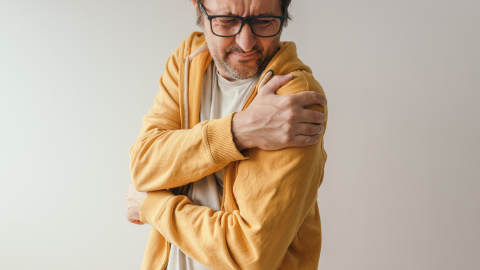Rotator Cuff Tendinopathy: 2025 JOSPT Guideline on Diagnosis and Rehab

Rotator Cuff Tendinopathy: 2025 JOSPT Guideline on Diagnosis and Rehab
This course includes
Overview
Rotator cuff tendinopathy is one of the most common causes of shoulder pain, often leading to significant functional limitations and reduced quality of life. This condition affects individuals across all activity levels—from sedentary adults to high-performance athletes—and is a frequent reason for seeking musculoskeletal care.
This comprehensive online course provides an evidence-based overview of the diagnosis, nonsurgical medical management, and rehabilitation of rotator cuff tendinopathies in adults. Based on the 2025 JOSPT Clinical Practice Guideline, it translates the latest research into practical, clinical strategies that healthcare providers can apply immediately in their practice.
Learning Objectives
In this online course, we will:
1. Describe the different elements to include during the assessment of adults presenting with shoulder pain suggestive of rotator cuff tendinopathy.
2. Design an evidence-based program for the rehabilitation of adults with rotator cuff tendinopathy.
3. Identify the various evidence-based nonsurgical medical options for the treatment of adults with rotator cuff tendinopathy.
4. Explain the role of patient education in the management of adults with rotator cuff tendinopathy, including strategies for addressing pain beliefs, activity modification, and self-management.
5. Discuss the key physical and psychological factors to consider when planning a safe and effective return-to-sport or activity strategy for individuals recovering from rotator cuff tendinopathy.
Audience
This course is intended for physiotherapists, physiotherapy students, and healthcare professionals involved in the assessment and management of shoulder conditions, particularly rotator cuff tendinopathy. It is particularly suitable for senior physiotherapy students who are looking to deepen their clinical reasoning skills, new graduates transitioning into musculoskeletal or orthopedic practice, and practicing clinicians seeking to update their approach based on the latest evidence.
Speaker Bio: Dr. Marc-Olivier Dubé

Dr. Marc-Olivier Dubé is a physiotherapist and postdoctoral research fellow at the La Trobe Sport and Exercise Medicine Research Centre (LASEM) in Melbourne, Australia. He has received a fellowship award from the Quebec Health Research Fund (FRQ-S). His past research has focused on the management of persistent shoulder pain and how patient-specific psychological and contextual factors such as pain self-efficacy and expectations can influence outcome. At LASEM, he is now involved in projects aimed at reducing the burden of post-traumatic knee osteoarthritis. He has established a nationwide knee injury inception cohort study exploring patients’ healthcare pathway and long-term outcomes following a serious knee injury.
Marc-Olivier has prior clinical experience as a physiotherapist working in a primary care private practice setting with people experiencing various musculoskeletal disorders, as well as concussions. He has also been involved in teaching in the undergraduate Physiotherapy program of Université Laval (Canada). Marc-Olivier was awarded with the 2023 Quebec Provincial Adaptation-Rehabilitation Research Network (REPAR) Engagement Award to underline his contribution to the development of adaptation-rehabilitation research, as well as his involvement and commitment to the research network. The high quality of his doctoral thesis also earned him a place on the honor roll of Université Laval's Faculty of Graduate and Postdoctoral Studies. He has published more than 30 peer-reviewed articles and presented in more than 30 conferences nationally and internationally.
The instructors

The Orthopaedic Division of the Canadian Physiotherapy Association helps our members improve their skills and service delivery through education, resources and networking.
With a reputation built on excellent instructors and a rigorous examination process, the Division offers tailored online e-learning, webinars, workshops, courses and practice resources for members at a reasonable cost and time commitment. Members learn from other practicing physiotherapists and stay current with a regularly updated curriculum and program delivery based on providing quality and modern treatment.

Material included in this course
-
Rotator Cuff Tendinopathy Diagnosis, Nonsurgical Medical Care and Rehabilitation
-
Welcome and resources
-
References and Additional Resources
-
Aims of the CPG
-
Methods of the CPG
-
Section 1: Assessment of Shoulder Pain Associated with RC Tendinopathy
-
Section 2: Nonsurgical Medical Interventions
-
Section 3: Rehabilitation Strategies
-
Section 4: Return-To-Play Protocols for Athletes
-
Take-Home Messages
-
Questions
-
Quiz
-
Feedback
I'm a member of the Canadian Physiotherapy Association (CPA). What are the discounts available to CPA Members on Embodia?
As part of our partnership with the CPA, we offer its members discounts on courses and Embodia Memberships. Learn more about the partnership on this page.
In order for the discount to be applied, you first need to authenticate your CPA membership. This is an important step as this is how Embodia 'knows' that you are a CPA member.
To authenticate as a CPA member, you need to sign in the CPA portal on this page, sign in to your CPA account, and then click the button on the page.
Please note that your email address on your CPA account must match your email address on Embodia. If needed, you can update your information on Embodia as outlined in this guide.

Is a certificate of completion included with this course?
Once you have completed the course, a certificate of completion (including learning hours and course information) will be generated. You can download this certificate at any time. To learn more about course certificates on Embodia please visit this guide.
This can be used for continuing education credits, depending on your professional college or association. If this course has been approved for CEUs in specific jurisdictions, it will be noted on the course page and CEU information may be added to your course certificate. Please read this guide for more information.